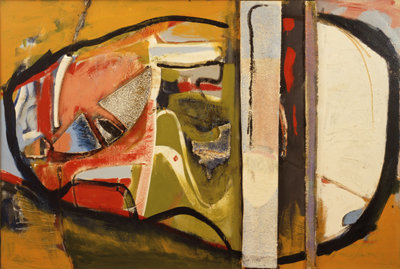Two exhibitions
dal 14/1/2009 al 20/2/2009
Segnalato da
14/1/2009
Two exhibitions
Gimpel Fils, London
Peter Lanyon. Comprising works made between 1962 and 1964, this exhibition explores his shift in focus and materials. In addition, Emily Jo Sargent presents new paintings from her ongoing series, 100 Pictures of Coney Island.

Peter Lanyon has been recognised as one of the most gifted artists of
his generation. An abstract painter of extraordinary vigour and energy,
throughout the 1950s he established his personal vocabulary of gestural
movement in and across the canvas. However, Lanyon's work started to
change direction around the end of 1962. Comprising works made between
1962 and 1964, this exhibition explores his shift in focus and
materials. Although it wasn't a radical break with his earlier work,
these paintings, drawings and constructions, made shortly before his
untimely death in a gliding accident, utilise very strong colour, have
sharper edged forms and are less specifically tied to the Cornish
landscapes of his home.
The shift in Lanyon's work can be explained by his awareness of artistic
changes and experiments taking place in London and New York. His
increasingly regular trips to the United States in the early 1960s
coincided with high-status exhibitions of Neo-Dada and Pop Art; he was
interested in the work of Robert Raushenberg and James Rosenquist. His
visit to Mexico whilst a visiting painter at the San Antonio Art
Institute in Texas in early 1963 might account for his use of hotter
reds, yellows and oranges during this period.
In the 1950s, Lanyon's constructions had been predominantly freestanding
objects, but in the 1960s he made an increasing number of wall reliefs
and a new kind of relationship emerged between paint and collage. While
earlier works such as Construction for St Just (1952) was collage with
paint, Climb Out (August 1964) is a painting with collage. The
object-encrusted canvas demonstrates the same preoccupation with holding
and pushing outwards from the surface, but is expressed in a different
way. This development was almost certainly prompted by the work of Kurt
Schwitters. Although he had known of Schwitters' work since the early
1950s, Lanyon had visited an exhibition of his work held in London in
1963. The relief paintings in this exhibition post-date Schwitters'
show.
It is sometimes difficult not to see these last works as the culmination
of Lanyon's career. However, as this exhibition seeks to demonstrate,
they are in fact an indication of the new trajectory his work was about
to take.
Peter Lanyon was born in St. Ives in 1918 and became a prominent member
of the artistic community that developed there in the years after the
Second World War. His first exhibition at Gimpel Fils was held in 1952
and the gallery continues to represent his estate. Lanyon's work can be
positioned within a tradition of English landscape painting; throughout
his career he sought to express a physical experience of being in and
moving through the land. Although his early works owe a great deal to
Ben Nicholson and Naum Gabo, his respect for local St. Ives artists and
his interest in English Romantic Samuel Palmer, identify him as a
uniquely Cornish modernist. His work was included in The Festival of
Britain in 1951, Documenta in 1959, and he represented Britain in the
1961 Sao Paulo Biennale. His work can be found in numerous
international public collections including The Tate Collection; The Arts
Council Collection; Ulster Museum, Belfast; Albright Knox Art Gallery,
New York; and the Smithsonian Institute, Washington DC.
...........................................
In this exhibition Emily Jo Sargent will present new paintings from her
ongoing series, 100 Pictures of Coney Island. Between 1997 and 1999
Sargent spent nine months living in New York and these works, created
since her return, embody a sense of both longing and hope.
Whilst living in New York, Sargent visited Coney Island, the faded
seaside resort, famously described in Lou Reed's 1976 album, Coney
Island Baby. But rather than depict the fairground and the peninsula's
faded glory, Sargent has chosen to focus on the natural environment and
a rare moment: her paintings depict the beaches, deserted and covered in
snow. Eschewing the familiar imagery of the rusting funfair and Nathan's
hot-dog stands, the paintings instead concentrate on the snow-covered
beach under heavy skies. Each work is a careful arrangement of flat
painted areas that dovetail together to capture the essence of a
momentary experience. Depicting still waters and the quiet, unpopulated
rocky shoreline, Sargent challenges the transitory nature of the scene,
freezing it in time.
Sargent's use of cool colours- blues, greys and whites in tonal harmony-
in combination with her use of clean lines and controlled painterly
technique could suggest an unemotional response to the landscape. The
absence of the gestural marks and her avoidance of things perceived to
be extraneous might suggest a detachment from her subject matter. But by
actively utilising these almost minimalist techniques, Sargent seeks to
evoke the sense of magic and hope that Coney Island holds for many of
New York's inner-city residents. In these paintings the blank landscape
allows the viewer to personally inhabit the work rather than have their
experience prescribed by a didactic emotional agenda. It is thanks to
their coolness that these paintings, depicting coastal landscapes, are
emotionally charged.
Emily Jo Sargent studied at Goldsmiths College and lives and works in
London. Selected exhibitions include: Liebe Leben (Love, Life), Rise
Gallery, Berlin, 2007; Everything Must Go, VTO, London, 2006; Acid Drops
and Sugar Candy, Transition Gallery and Fosterart, London, 2005;
Something is Already Happening curated by Dan Howard-Birt, Rosy Wilde
Gallery, London, 2004
private view: Thursday 15 January 2009, 6-8pm
Gimpel Fils
30 Davies Street - London
Gallery opening hours: Mon - Fri 10am - 5.30pm, Sat 11am - 4pm
Free admission



